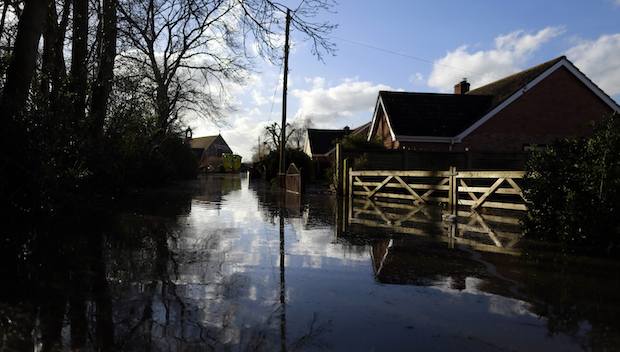How did the Arab Spring reach British homes? Did the Brits not have enough to handle, what with the unprecedented storms that lashed the British coastline and caused extensive flooding, isolating tens of thousands of homes and leaving their inhabitants helpless?
The troubles became worse with the loss of electricity both in cities and in the countryside, as the flooded land forced people to flee. Officials in many areas had to evacuate residents and organize temporary safe houses for people who lost their homes.
Were the Brits not suffering enough from all that weather? Did they also have to suffer further from the “Arab Spring”? Well, I don’t mean the “Arab Spring” exactly; what I mean is more the kind of chaos and misunderstandings it created.
As the Egyptians like to say, let us start from the end. Each February, certain Arab countries mark the anniversary of the “revolutions of the Arab Spring.” February is also the month Kuwaitis mark the expulsion of Saddam Hussein’s army from their country; they hold joyful celebrations even though the memories of that tragedy held by all Arabs will never go away.
Hundreds of thousands of Arabs—if not millions—justifiably feel pain about what has become of those countries whose “revolutions” had promised a “spring,” only to see many people die, and for politicians to exploit it for profit and then invest that profit in jihadist impostors. Meanwhile the preachers of hypocrisy everywhere rack up interest unashamedly, dancing on the ruins of other people’s homes and the remains of innocent people who had nothing to do with any of it.
But does what came of the Arab Spring mean we should be against change and for stagnation? Well, we should be, if “change” means the sort of death and destruction we have seen, but not if avoiding change is merely a form of paralysis. If the former rulers of the societies affected by the Arab Spring had been aware of the inevitability of change, there would have been no need for these revolutions, which changed only the faces of the people in power.
If the leaders of the deposed regimes had simply chosen to live and let live, they would have done well. Had they realized that pressure builds up until it explodes, they would have thanked God for their blessings and avoided burdening their people too much, as though they were just pack animals with no thoughts or feelings. But they didn’t manage their administrations well, and they were ungrateful for the blessings they received. And so they failed.
Iraq did not need to go into the maze it entered when it laid siege to Kuwait. Had its inspired and brilliant leader realized what any person with even limited understanding realized—the West was never going to allow him to sit on the oil throne of Kuwait. Since he miscalculated when he invaded, Saddam could have defused the situation by withdrawing his troops back over the border.
But Saddam didn’t do that. He was deluded when he envisioned an expanded role for himself, so he played that role and convinced himself he was the hero of what he saw as the “mother of all battles.” And why wouldn’t he believe that, when he also believed he had forced Iran’s Ayatollah Khomeini to drink from the poisoned chalice of Al-Qadisiyah, that infamous battle all those centuries ago when the Arab Muslims first took over Persia. Imam Khomeini himself came to power with the delusion that he could carry out a revolution if it was dressed up in the cloak of Islam, just because the West had decided to suddenly and unexpectedly abandon the Shah, its venerable ally, leaving him to meet his miserable fate alone.
There are more examples of such delusion. More than five centuries ago, when Granada fell, the last king of Andalusia was rebuked by his mother for being so blind. “You cry like a woman over a wasted kingdom,” she told her son, “a kingdom you failed to preserve like a man.” Was it really necessary for so many Arab capitals to fall in so similar a manner, even if the specifics of their respective downfalls were different?
But what has all this got to do with the Arab Spring?
There was a family show called Outnumbered on the BBC the other night. It is a parody of family life, showing the difficulties of raising children, as well as the problems children have in connecting with their parents. In last week’s episode, the father was surprised at the chaos in his home and the lack of understanding between his family members.
His response was a sarcastic cry: “It seems like the Arab Spring has reached my house.”
